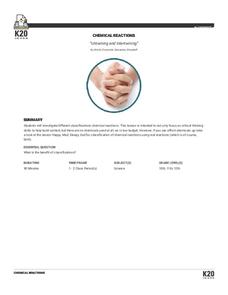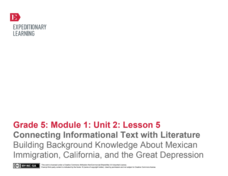K12 Reader
Using Prior Knowledge
Sometimes it's hard to relate to a new text. Teach kids to use their prior knowledge when reading something new with a comprehension exercise. A short passage tells them how to think of their brains like filing systems, and provides five...
Chicago Botanic Garden
Accessing Prior Knowledge: Global Climate Change Survey
Begin a unit on weather and climate change by assessing prior knowledge of the topic. Learners respond to a survey with questions that ask what they think causes climate change, the effects of climate change, and if it is important to...
Curated OER
Mini-Lesson Planning for Inferences
Making inferences and drawing conclusions is a key component to successful active reading. Encourage your class to use context clues and prior knowledge to infer different elements of a story, including the setting, plot, and character...
Curated OER
Text Clues and Prior Knowledge
Explore making predictions as a reading strategy. As a class, read "Blue Light, Green Light," stopping to make a prediction. After recording a prediction on the graphic organizer, discuss the thoughts behind your idea. Then, continue...
Curated OER
Prior Knowledge: What Do You Know About Dogs?
Students consciously activate prior knowledge in order to comprehend new information about a given subject. In this comprehension and prior knowledge lesson, students use a graphic organizer to activate prior knowledge and use their...
Curated OER
Lesson 2: The Constitution: Our Guiding Document
Explore the structure and content of the US Constitution in the second lesson of this five-part social studies series. A collection of activities, games, and videos complement a class reading of a document summarizing the US...
BrainPOP
Civil Rights Lesson Plan: Tracking History Through Timelines
Use the accompanying assessment to determine your class's prior knowledge on Martin Luther King, Jr. before beginning a lesson plan on the famous civil rights movement leader. The resource has young historians thinking about life for...
Curated OER
Myth Lesson Plans
What is the difference between myths, legends, and folktales? From greek mythology and creation myths to heroes and heroines, here is a nice series of lessons for providing your kids with solid foundational knowledge about myths.
Rational Number Project
Initial Fraction Ideas Lesson 22: Overview
Have young mathematicians subtracting fractions in no time with this manipulative-based math lesson. Using their sets of fraction circles, students explore a number of word problems involving the subtraction of fractions before working...
Curated OER
Understanding a Story
Reading comprehension is the name of the game! After listening to the teacher model and share personal prior knowledge about small children and what they do with food, the class discusses how they too can use prior knowledge to...
National Endowment for the Humanities
Revolution '67, Lesson 2: What Happened in July 1967? How Do We Know?
Even in a world in which dozens of participants and curious onlookers record every controversial event, the basic facts of what happened are often in dispute. Revolution '67, Lesson 2 explores 1967 Newark, New Jersey using an examination...
K20 LEARN
Untwining And Intertwining: Chemical Reactions
What happened when the chemistry teacher told a bad joke? There was no reaction! A creative take on the traditional reaction types lesson invites learners to draw their own conclusions about how compounds and elements combine. Groups...
Media Smarts
Facing TV Violence: Consequences and Media Violence
Make your class aware of the difference between media violence and real violence. Using prior knowledge, a video clip, and a worksheet, class members explore and discuss the unrealistic portrayal of violence in the media. Learners...
Scholastic
Lesson One: The Earth, Background and Glossary
How much do you really know about our planet? Middle schoolers build up their prior knowledge about Earth, its placement in the solar system, its composition, and important geological vocabulary with an introductory earth science lesson.
Street Law
The Challenge of Selecting an Ideal Supreme Court Nominee
Nearly every president has had the opportunity to name a nominee to the United States Supreme Court. But what makes someone an ideal candidate to become a Supreme Court justice? High schoolers test their prior knowledge about the Supreme...
Curated OER
Using Prior Knowledge from Personal Experiences-Understanding Duke Ellington
Students research the life of Duke Ellington. For this music history lesson, students draw comparisons between the early life experiences of Duke Ellington and themselves. Students work in small groups to compare Ellington's resistance...
EngageNY
Advanced Factoring Strategies for Quadratic Expressions (part 1)
Factoring doesn't have to be intimidating. Build on prior knowledge of multiplying binomials and factoring simple trinomials to teach advanced factoring of quadratic expressions with a lesson that uses various methods of exploring the...
EngageNY
Connecting Informational Text with Litearature: Building Background Knowledge About Mexican Immigration, California, and the Great Depression
Help your class transition as the setting in the novel Esperanza Rising, by Pam Muñoz Ryan, moves from Mexico to California. Beginning with prior knowledge, and moving into jigsaw research groups, class members add to and create posters...
Curated OER
Stargirl Lesson
Students read a short novel while filling in a graphic organizer for problem and solution. In this sociology lesson, students use a prior knowledge and relate the text to theirselves and to think about their own need to fit in versus...
Center for Civic Education
Lesson 1: Who Can Vote in the United States?
The purpose of this first lesson in a series of five about enfranchisement and suffrage is to determine what class members already know, or think they know, about voting and voter registration. Groups answer questions on the provided...
Curated OER
Exploring Arizona's Biotic Communities Lesson 4: Which Team Are You On?
Who is not drawn to trading cards? In this activity, junior ecologists create a trading card of an animal or plant from one of Arizona's biotic communities. Gorgeous sample cards are provided in the lesson plan as well as a plethora of...
National Security Agency
Classifying Triangles
Building on young mathematicians' prior knowledge of three-sided shapes, this lesson series explores the defining characteristics of different types of triangles. Starting with a shared reading of the children's book The Greedy Triangle,...
K20 LEARN
Things Are Lit at Thornfield: Jane Eyre
Jane Eyre offers scholars an opportunity to practice reading comprehension skills. Pairs are assigned a word from the text, use their prior knowledge, and consider the context, connotation, and denotation of the word to posit a...
Curated OER
Build Mastery: Making Inferences
Do your youngsters realize that they are constantly making inferences? Expose this inner process by bringing out the book they will be reading. Ask scholars what they think the plan is, and explain that their answers are the product of...

























